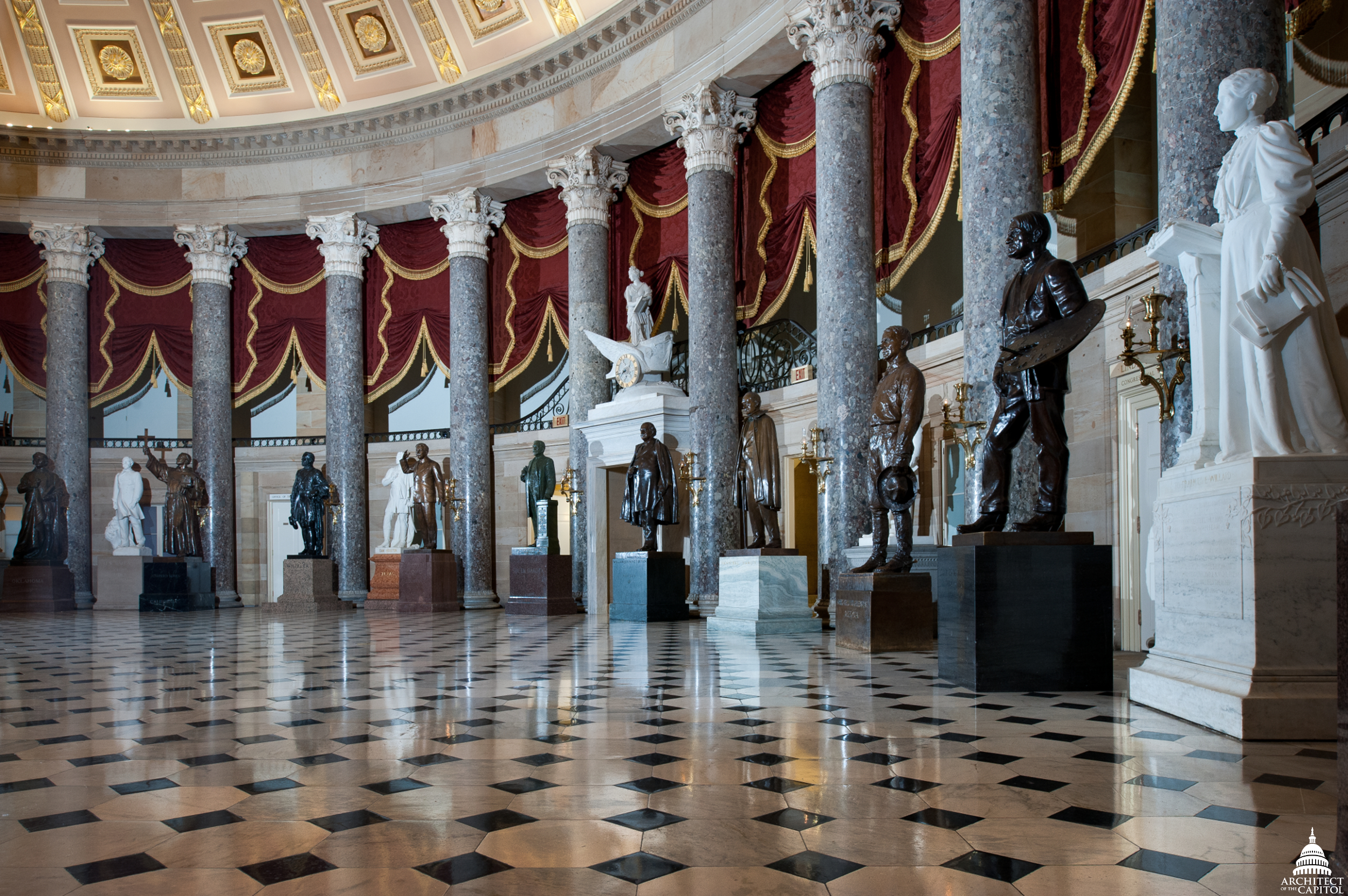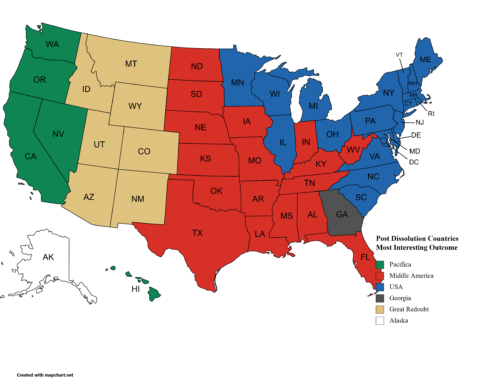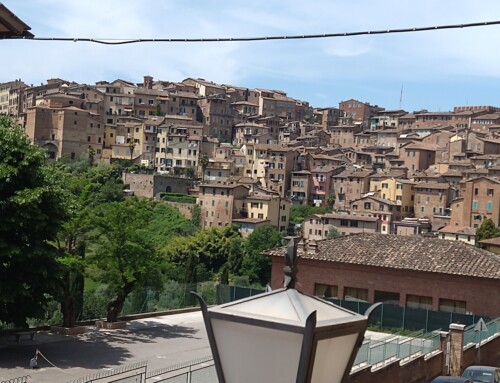The first week of January, 1994, I found myself walking slowly through the Capitol Rotunda with my friend, Bob Gorman. Bob was a small town newspaper editor going through DC, and since I was about to move away, we met for a leisurely walk through the nation’s Capitol building, as one could do back then. We commented on the two statues each state sent to Statuary Hall, and how two Western States, Hawaii and California, each sent a statue of a missionary priest (Father Damian of Molokai and Father Junipero Serra who helped establish the chain of missions on the California coast).
Tourists respectfully walked around, commented on the massive painting of The Apotheosis of Washington on the dome of the Rotunda, while Congress members and staffers went about their business. As a familiar face walked very slowly towards us deep in thought, I elbowed Bob and whispered, “I think that is John Kasich.” In his classic nature, Bob responded, “You would be right in that thought.”
“Mr Kasich,” I said quietly, but directly when he was close, “I want to tell you that I’m very impressed with how you carry yourself and of the strength of your convictions since you’ve come to the House, and I hope you are successful for years to come.” He looked up and said his thanks and continued on. Then about 15 feet away, he stopped, turned around and walked back. He asked me, “You’re not from Ohio, are you?” I replied that I was not. He asked my name and what I was doing there. I told him my name, that I was an Air Force Captain stationed at the Pentagon and was departing in two days for an overseas assignment in Japan. He told me to stay right there and then turned and walked away.
I asked Bob, older and wiser than me by far, what we do. He stated simply that we wait. Ten minutes later, Representative John Kasich returned and told us to follow him. He walked us down a flight of stairs and around some corridors, and eventually through the Republican Cloak Room, to a hand shake with the Sergeant-at-Arms, and then onto the House floor. He personally described the business of the House of Representatives, showed us where Puerto Rican secessionists attacked the House chamber in 1954 and shot live bullets in the chamber and wounded 5 people. He asked if we would like to stand behind the podium. Who wouldn’t.
It was an incredibly kind and selfless act on the part of one man who stood to gain nothing from the kindness other than another man’s respect. And that is what John Kasich gained from both Bob and me that day. When I arrived in Japan a week later, I wrote him a note of thanks stating my appreciation for taking time away from his personal schedule that morning to show us what we could not see on a tour when he ought by rights to have been working in his office. And to no surprise, he hand-wrote a response telling me that if I ever needed anything to let him know. I never have written him back, but I am sure he’d honor any reasonable request.
What a change our country has seen since that day in 1994. In the intervening years, the Capitol went from open to the public, to open for tours only, to largely closed for fear of security risk. The House and Senate Chambers were once places where real work was done on behalf of the American People, with genuine argument and genuine compromise conducted every day. Alan Simpson of Wyoming and Ted Kennedy of Massachusetts were close friends despite being ideological foes. They went to the gym together and like most of their peers, they ate and they drank together. They did their constituents’ bidding by getting to know and respect their peers even if they didn’t agree with their peers’ policy positions.
But shortly after that day in 1994, the holy value in the Capitol began to change from compromise to purity of position. And with that men and women who once dined and got tipsy together ceased speaking and form there over time grew to spite one another, and in the process, the public.
So was it a surprise when on Wednesday, January 6th, the United States Capitol was breached by an angry mob intent on capturing the Vice President of the United States and as many members of Congress as possible, to what end only they knew? Was it a surprise, that after a very public campaign of planning for a rally that was endorsed by the President of the United States to his nearly 89 million Twitter followers that thousands would gather to march on the Capitol? Was it truly a surprise when the MAGA mob, screaming to protect the Republic from a thrown election for which no shred of evidence was produced in any court that held up to scrutiny, broke windows and doors to breach the Capitol, and defecated in the very halls of the Republic which they claimed to defend? It was shocking to see a gallows erected outside the Capitol. But was it a surprise? It was shocking to see the Confederate flag, the flag of separatists who fought against the United States, carried through the Capitol in the name of saving the Republic. But was it a surprise?
I cried tears of sadness that Wednesday afternoon. Sadness for the members of Congress and their staffs barricaded in their offices while a mob broke down doors to assault them. Tears of sadness for the people killed that day, people who died defending the building and people who proclaimed they would die for a President who has yet to publicly acknowledge their deaths. Sadness for the loss of our country’s moral authority to ever tell another country how they ought to conduct themselves. Sadness for my friends and colleagues of years past who thought this was a just action by the mob. Sadness that I served 30 years in uniform to see the country come to this. And sadness that the experience I had as a young professional when a young Congressman escorted my friend and me through the halls of that very building will likely happen rarely, if ever again.
I wrote about this to my cousin in Serbia, with the expectation that he, who witnesses these types of events more often than we do here would say, “You got what you deserved.” His response surprised and cheered me. He told me that their whole country watched the events unfolding on their televisions. He said the scenes were reminiscent of their own country the previous years. But then he said how impressed they were at how quickly our police were organized and took back the building and that our House and Senate were voting that very night. He told me that we had genuine reason for optimism while they had only some vague hope that fades over time when nothing is actually done. He said that we are wounded and need to heal and recover our moral authority, but that we are still the country they all wish they could come live in.
That was a powerful and necessary adjustment to my point of view, one that I won’t soon forget. One that I hope everyone from MAGA on the right to Antifa on the left and all in-between come to understand and appreciate. One that I hope could inform Congress and those in the Executive branch to work to keep this country the place everyone wants to come to.






Leave A Comment